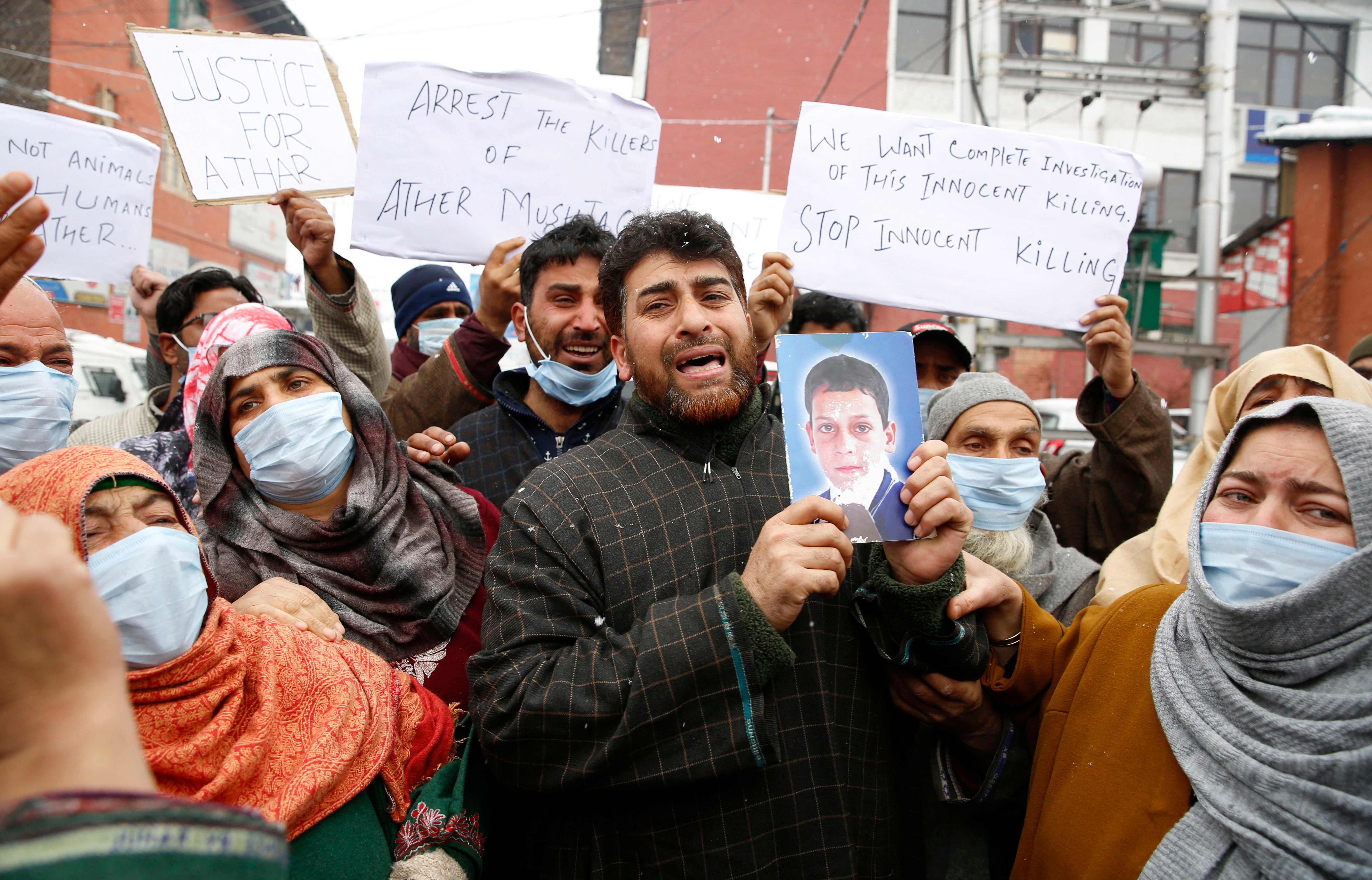For families in Kashmir it’s a long wait for bodies as army probes allegation of ‘staged killings’
A flashpoint for anti-India protests, Kashmir has seen a large number of ‘encounters’ in recent years where people accuse the army of fake killings, reports Shweta Sharma


Mushtaq Ahmad Wani has kept a fresh grave ready near his home in the Pulwama district of Jammu and Kashmir. It will be the final resting place for his 16-year-old son who was gunned down in an “encounter” with the Indian army in December 2020, if his body is ever returned to him.
The 42-year-old father is among several other parents in the Indian Himalayan federal territory, anxiously waiting for the body of a slain family member so they can be given a proper burial, even as the army admitted to wrongdoing by its personnel in a gun battle in a separate case in July.
The rare admission isn’t likely to act as a salve to the injuries caused by decades of strife in this heavily militarised region where both militancy and state retaliation have devastated hundreds of families.
The ordinary way of life for Kashmiris has been disrupted by internet blackouts, disappearances, closure of institutions, street protests and now this, the long wait for bodies of family members.
Wani’s teenage son Athar Mushtaq, and two others – Aijaz Maqbool Ganai, 20, and Zubair Ahmad Lone, 22 – were killed on 30 December in Srinagar’s Lawaypora area in what the army called an “encounter”, a catch-all term used by the authorities to describe any clash with suspected militants.
In an interview with The Independent, Wani said his son had gone to stay at his friend’s house for the night. He had called his sister on the afternoon of 29 December, saying he would return in the morning, but never did.
“His body was thrown into the army truck in front of my eyes as if it was an animal. I pleaded to them to let me see my son for one last time and laid in front of the truck in protest,” he said.
The family decided to follow the army convoy despite being stopped at various checkpoints and warned not to tail them. Wani said they chased the convoy till the hill station of Sonmarg. On reaching the burial ground, he was allowed to briefly see the body of his son and got the chance to lower the bare body into a grave dug by the army, in the chilly winter night.
“It was for a brief moment when we saw him in the dark of the night with two bullet holes as his body lay in the snow. My wife was inconsolable,” he said.
Wani and the two other families have accused the army of staging these killings. Their demand for the bodies of their children recently became a rallying cry on Twitter through a hashtag campaign – “return the bodies” – as more people added their voices to the chorus.
The parents have also been demanding proof from the army of their sons’ involvement in terrorism. So far, the army has released a video from the site of the encounter where they can be heard asking the “trapped militants” to surrender.
“Why were the parents not called to the encounter site to pressure them to surrender,” Wani asked. The army issued a statement that said they targeted the house after inputs that it harboured terrorists who later lobbed a grenade at them.
Months prior to these deaths, Safit Jan, the mother of 16-year-old Mohammad Abrar, fell to her knees when the body of her son was returned to her after 72 days.
Abrar was among three Kashmiri youths who were killed allegedly by army personnel on 18 July 2020. He and two others – Ibrar Ahmed, 25 and Imtiyaz Ahmed, 21 – trekked to the Shopian district to find work in the orchards.
Jan described her son as a “bright child” who scored good marks in school and had taken work to cover expenses for books, bags and other things he would need for school next year. He was also paying off his family’s debts.
“We got to know of their disappearance 18 days after they left when we were not able to get in touch with them. We filed a missing report in the police station and the next day we saw pictures of their dead bodies on TV,” she said.
“He promised me to return and said he would put an end to all our problems. We were heavily dependent on him for most of the work,” she said.
A press statement from the Jammu and Kashmir police said that captain Bhoopendra Singh of Rashtriya Rifles 62 battalion, Tabish Nazir Malik and Bilal Ahmed Lone allegedly shot the three in cold blood on the same day in Amshipora village and planted weapons on their bodies before “stripping them of their identities and tagging them as hardcore terrorists" to claim a cash reward of 2 million rupees (£20,000).
It was the first time the Indian army acknowledged it exceeded powers given under the Armed Forces Special Powers Act (AFSPA) – a legislation human rights groups have demanded be repealed, claiming that its misuse has led to grave violations. The law gives sweeping powers of search and seizure, shooting at sight, and immunity from prosecution to the army.
The Indian army chief said after the July killings the armed forces had “zero tolerance for violation of established guidelines while operating in disturbed areas”. An internal inquiry by the army found “prima facie evidence" against the security personnel who were involved in the encounter in Shopian.
However, according to reports, an army spokesperson later denied the allegation in the police’s 1,400-page chargesheet, filed five months after the alleged encounter, that the Shopian gunfight was “staged” for the reward money. When contacted, an official told The Independent that the army will not issue any further comment beyond the public statement already given.
According to media reports, Captain Singh is currently in the custody of the Indian army, awaiting court martial proceedings.
In the July encounter, Jan also lost her son-in-law, Ibrar Ahmed, who is survived by his wife and a one-year-old child.
Jan’s family now wants to meet those who conspired to kill their son and ask them why they left them “with no hope for the future”. They want the culprits to hang.
Mohammad Maqbool Ganai, an officer with the Jammu and Kashmir police, who lost his 20-year-old son Aijaz in the encounter on 30 December, said his son was not involved in any terrorist activities.
Ganai, who has assisted the Indian army in counter-terror operations, said his son was on bed rest for a month prior to the encounter due to a medical condition.
“He did not move out for the last 29 days. How can he become a terrorist in just two hours?” he asked.
Caught in the crosshairs between India and Pakistan’s political rivalry, Jammu and Kashmir has seen thousands of cases of enforced disappearances, extra-judicial killings and torture, according to the rights group Jammu Kashmir Coalition of Civil Society.
India accuses Pakistan of radicalising hundreds of youths, many of whom have been killed in “counter-terrorism” operations. This year alone, the army said it killed 206 terrorists as compared to 152 in 2019.
The army has devised the strategy to thwart large-scale public funerals attended by thousands of mourners by not allowing families to hold private burials for those killed in counter-terror operations. The army said it not only stopped the spread of Covid infection this way but also “stopped glamourising terrorists and avoided potential law and order problems".
“This action is a historical one. The bodies of those killed in the encounter are not returned to the families since 2019,” the Kashmir inspector general of police (IGP) Vijay Kumar told The Hindu newspaper. The army burial grounds in the remote mountains of Sonmarg have hundreds of unnamed graves.
“The army thinks this is the best way to win the war, by simply killing not just combatants but non-combatants as well," Ather Zia, a prominent Kashmiri author and political anthropologist at the University of Northern Colorado, said.
The refusal to return the bodies is a crime and violation of the human rights, she added.
Siddiq Wahid, a professor and political commentator, said acceptance of the wrongdoing in the July encounter by the army is welcome, “because justice in even a single incident of a false killing is a dent in the Indian state's iron-dam of denial”.
"So we will wait, even if it is with a high dose of scepticism,” Wahid said.




Join our commenting forum
Join thought-provoking conversations, follow other Independent readers and see their replies
Comments